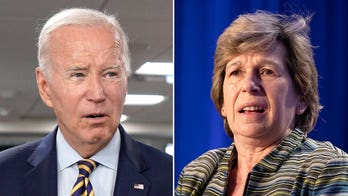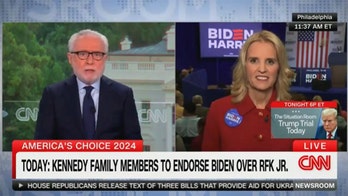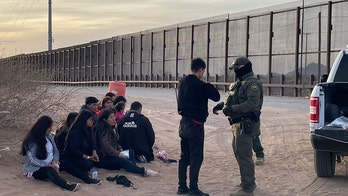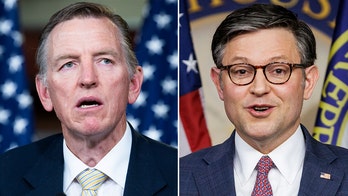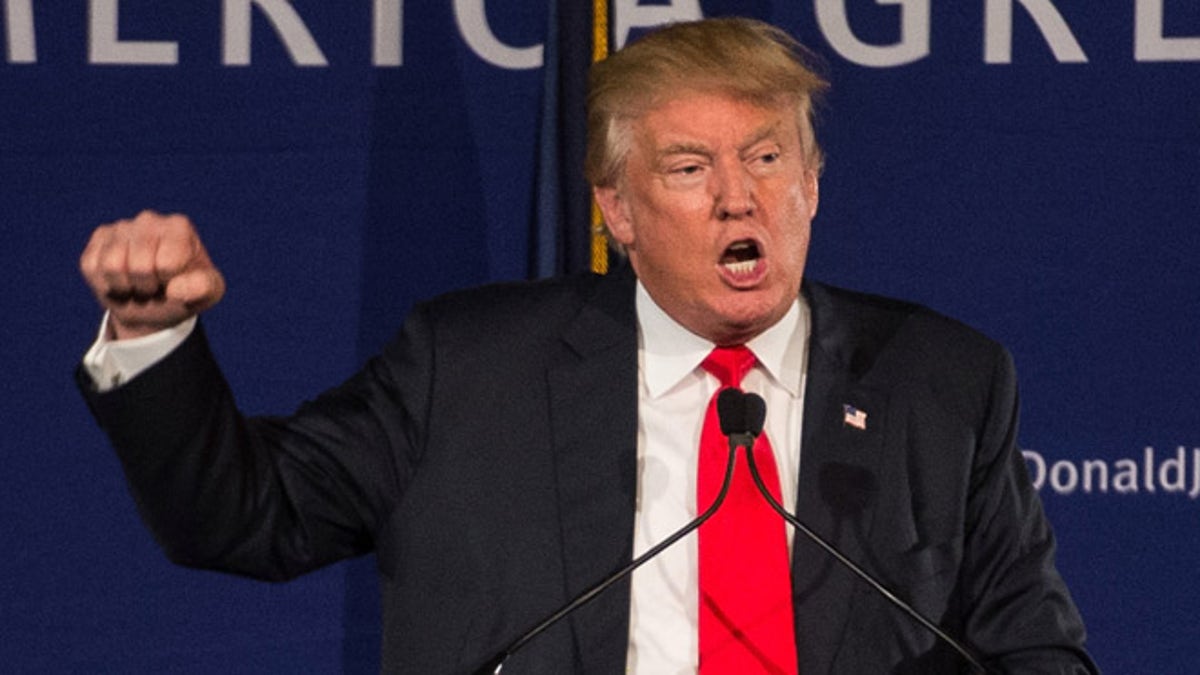
Republican presidential candidate Donald Trump speaks to the crowd at a Pearl Harbor Day Rally at the U.S.S. Yorktown December 7, 2015 in Mt. Pleasant, South Carolina. The South Carolina Republican primary is scheduled for February 20, 2016. (Photo by Sean Rayford/Getty Images) (2015 Getty Images)
The response from his fellow 2016 presidential hopefuls to Donald Trump’s call for a "total and complete shutdown of Muslims entering the United States" was swift and condemning – assailing the real estate mogul’s rhetoric as everything from “divisive” to “unhinged.”
Florida Sen. Marco Rubio, whose recent surge in the polls has made him a frequent target of Trump’s attacks, said he disagreed with Trump’s comments.
“His habit of making offensive and outlandish statements will not bring Americans together,” Rubio tweeted on Monday night.
Trump’s proposed ban would apply to immigrants and visitors alike, a sweeping prohibition affecting all adherents of Islam who want to come to the U.S. The idea faced an immediate challenge to its legality and feasibility from experts who could point to no formal exclusion of immigrants based on religion in America's history.
Trump's campaign said in a statement such a ban should stand "until our country's representatives can figure out what is going on." It said the proposal comes in response to a level of hatred among "large segments of the Muslim population" toward Americans.
"Until we are able to determine and understand this problem and the dangerous threat it poses, our country cannot be the victims of horrendous attacks by people that believe only in jihad, and have no sense of reason or respect for human life," Trump said in the statement.
At an evening rally in South Carolina, Trump supporters cheered and shouted in support as he read his statement. Trump warned during his speech that without drastic action, the threat of attacks is "going to get worse and worse."
"As he says, we have to find out who they are and why they are here," Rod Weader, a 68-year-old real estate agent from North Charleston who attended the rally and said he agreed with Trump's plan "150 percent." ''Like he said, they are going to kill us and we've got to stop it."
While many of Trump’s supporters voiced their support of the mogul’s call for a shutdown, even some of the most hardline conservative presidential candidates tried to distance themselves from the comments.
"Well, that is not my policy,” Texas Sen. Ted Cruz said. “I've introduced legislation in the Senate that would put in place a three-year moratorium on refugees coming from countries where ISIS or al-Qaida control a substantial amount of territory. And the reason is that's where the threat is coming from."
New Jersey Gov. Chris Christie’s comments were more forceful and direct.
“There are folks in this race who don't care about what the law says because they're used to being able to just fire people indiscriminately on television. So, they don't have to worry about what laws say or not say."
Trump’s campaign did not immediately respond to questions about whether it would also include Muslims who are U.S. citizens and travel outside of the country, including members of the military, or how a determination of someone's religion might be made by customs and border officials.
Instead, Trump said via a campaign spokeswoman: "Because I am so politically correct, I would never be the one to say. You figure it out!"
There are more than 5,800 servicemen and women on active U.S. military duty and in the reserves who self-identify as Muslim and could be assigned to serve overseas. Trump said in an interview Monday night on Fox News, "They'll come home." He added, "This does not apply to people living in the country, except that we have to vigilant."
It was also unclear whether Trump's ban would apply to Muslim allies in the fight against Islamic State militants. Ari Fleischer, a former aide to Republican President George W. Bush, tweeted, "Under Trump, the King Abdullah of Jordan, who is fighting ISIS, won't be allowed in the US to talk about how to fight ISIS."
Bush’s vice president, Dick Cheney, who has shied away from the spotlight since leaving office, even weighed on Trumps’s comments.
“I think this whole notion that we can just say no more Muslims, and just ban a whole religion goes against everything we stand for and believe in,” Cheney said. “Religious freedom has been a very important part of our history and where we came from. ... It's a mistaken notion.”
Democratic frontrunner Hillary Rodham Clinton also weighed in on Trump’s comments, calling them “reprehensible, prejudiced and divisive,” while Vermont Sen. Bernie Sanders said “[w]e are a weak nation when we allow racism and xenophobia to divide us."
The Associated Press contributed to this report.

